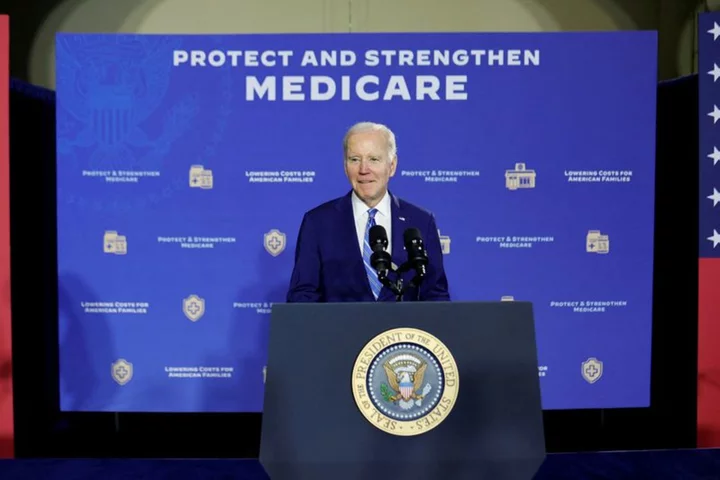By Brendan Pierson
(Reuters) -The U.S. government's Medicare health insurance program can begin negotiating prices for some prescription drugs this fall under a new program, a federal judge ruled on Friday, vindicating one of President Joe Biden's signature initiatives.
The order by U.S. District Judge Michael Newman in Dayton, Ohio, comes in a lawsuit brought against the Biden administration by the U.S. Chamber of Commerce.
The nation's largest business lobbying group argues that the program violates the U.S. Constitution by allowing the government to force drugmakers to accept unfairly low prices, and would stifle innovation.
Newman in a preliminary order rejected that argument, finding that drugmakers were unlikely to prevail in the case. He said they were not being forced to give anything up because participating in Medicare is "completely voluntary."
"As there is no constitutional right (or requirement) to engage in business with the government, the consequences of that participation cannot be considered a constitutional violation," he wrote.
The Chamber of Commerce and the U.S. Justice Department did not immediately respond to requests for comment.
The Biden administration "will continue fighting to lower health care costs for American families, no matter how many challenges Republicans and Big Pharma put in our way," White House spokesperson Karine Jean-Pierre said in a statement.
Although Newman's ruling allows the price negotiation program to begin as scheduled on Oct. 1, the judge allowed the lawsuit to continue, denying a motion by the government to dismiss it altogether.
The ruling is the first to come from multiple lawsuits by drug companies and industry groups challenging the program. Newman was appointed to the bench by Republican former President Donald Trump.
The drug price negotiation program is part of the Inflation Reduction Act, which Biden, a Democrat, signed last year.
Americans pay more for prescription medicines than people in any other country. The program aims to save $25 billion annually by 2031 by requiring drugmakers to negotiate the prices of selected expensive drugs with the U.S. Centers for Medicare and Medicaid Service (CMS), which oversees Medicare.
Medicare mostly serves the millions of Americans aged 65 and older.
Drugmakers whose medicines were selected for the first round of pricing negotiations must agree to begin talks on Oct. 1. Those who do not negotiate either would have to pay steep penalties, up to 19 times a drug's sales, or stop participating in the government healthcare programs, which account for a significant portion of the companies' U.S. sales.
CMS announced the first 10 drugs to be negotiated on Aug. 29. They include the blood thinners Eliquis from Bristol Myers Squibb and Pfizer, Xarelto from Johnson & Johnson, Merck & Co's diabetes drug Januvia, and AbbVie's leukemia treatment Imbruvica.
The negotiated prices would take effect in 2026 with a minimum discount from the list price at 25%.
The Chamber of Commerce's lawsuit is one of several similar cases challenging the program. The others were filed by individual drugmakers and by Pharmaceutical Research and Manufacturers of America, the leading drug industry lobbying group.
Companies that have sued over the program include J&J, Merck, Bristol Myers and Boehringer Ingelheim, which make drugs on CMS's negotiation list.
The Chamber of Commerce was the only plaintiff to ask for a preliminary injunction halting the price negotiations while its lawsuit proceeds. The other lawsuits are moving at a slower pace, and judges may not rule on them until next year.
The Biden administration has repeatedly said there is nothing in the Constitution that prohibits drug price negotiations. Many other countries already negotiate drug prices.
(Reporting By Brendan Pierson in New York and Nate Raymond in Boston; additional reporting by Costas Pitas; Editing by Alexia Garamfalvi, Bill Berkrot, Chris Reese and Leslie Adler)









